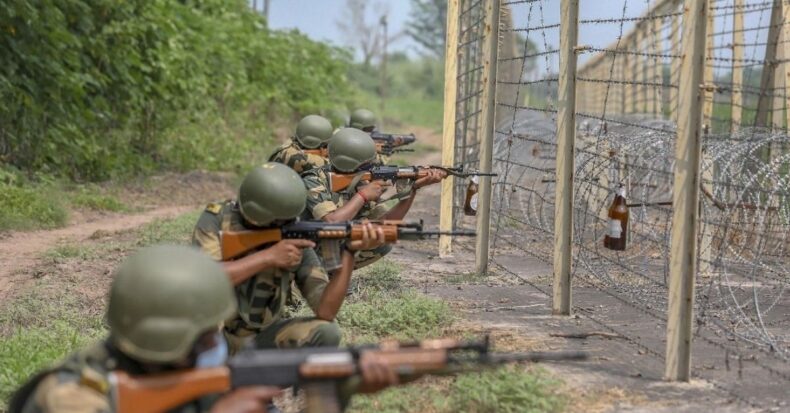Border Security Force has now acquired the power of search and arrest in Assam, Bengal, and Punjab, more deeply.
Officers of the Border Security Force (BSF) can now make arrests, carry out searches and seize materials in the deeper areas of the states of Punjab, Bengal, and Assam.
The Centre on 11th October declared the expansion of the jurisdiction of the BSF. Earlier, under Section 139 of the Border Security Force Act 1968, the BSF were allowed to exercise their power over 15 kilometres in this area; after the notification of the Home Ministry on Monday, its power was extended to 50 kilometres belt moving parallel to the National border in the states of Punjab, Bengal, and Assam, guarding the International boundaries.
The Union Ministry of Home Affairs (MHA) has also given permission to raid and arrest under 50 kilometres inside the Indian Territory from the International Borders along the Pakistan and Bangladesh borders.
The new notification also empowers an officer of the rank corresponding to that of the lowest ranking member of the BSF, under CrPC, to exercise and discharge duties and the powers without a warrant or without an order from a Magistrate.
The Border Security Force is now also empowered to arrest any person against whom any reasonable complaint had been made or against whom any credible information has been received, or who has been concerned with any cognizable offence.
Its Significance
The BSF officials believe that the amendment will help them keep a better check on criminal activities on trans-border.
The Security Force has said, “The amendment effected on 11th October establishes uniformity in defining the area within which Border Security Force can operate as per its charter of duties and execution of its role and task of border guarding in its area of deployment” in the statement, reported by the PTI news agency.
The border stretch under BSF in BJP ruled Gujarat that shares its border with Pakistan was reduced from 80 kilometres to 50 kilometres. In Rajasthan, the control remained the same, while states like Ladakh, Kashmir, Jammu, Meghalaya, Nagaland, Tripura, Mizoram, and Manipur had been entirely under the Border Security Force’s jurisdiction with no limit prescribed for the previously mentioned northeastern states.
The MHA notification said that the Centre Government had amended the ‘schedule’ determining the borders stretch where the Border Security Force would have authorities of search, seizures, and arrest under the Acts like Criminal Procedure Code (CrPC), Customs Act, NDPS Act, as well as Passport (Entry to India) Acts to Meghalaya, Tripura, Nagaland, Mizoram, and Manipur; Union Territories of Jammu & Kashmir and Ladakh; and a 50km-belt in Assam, Bengal, Punjab, Rajasthan, and Gujarat.
The Union Ministry of Home Affairs (MHA) further claimed that the recent dropping of weapons with drones from across the border had induced this expansion of power in the borders of Pakistan and Bangladesh. It alleged that this motion would help the country prevent the illegal activities linked to national security in ten States and two Union Territories.
Opposition’s Argument
This amendment enables BSF to acquire similar power to the state police-This has raised disagreement from various political leaders, presenting an argument that the enhanced power to function on the larger area, deeper under the states to the BSF, is an attack to federalism.
This move has been widely denounced by the Opposition through a series of tweets that included the tweet of Punjab Chief Minister Charanjit Singh Channi, Congress General Secretary Randeep Singh Surjewala, and Trinamool Congress Vice President Yashwant Singh.
Punjab Chief Minister Charanjit Singh Channi had met Home Minister Amit Shah on 5th October at Shah’s residence in New Delhi aftermath of the Lakhimpur Kheri violence where eight people, including four farmers and local journalist, had lost their lives.
The move occurring just after the meeting has sparked a massive controversy in Punjab, instigating a Congress vs Congress crisis. CM Channi’s party has attacked him “for handing over half of the state to the center.”
The other criticism against the move called the empowerment of the BSF in such states “conspiracy,” “dangerous,” “irrational,” “unconstitutional,” “mischievous,” “infringement,” “misuse of power,” and “the attack on federalism.”
CM Charanjit Singh also tweeted condemning the centre’s decision, urging to withdraw the decision. 














